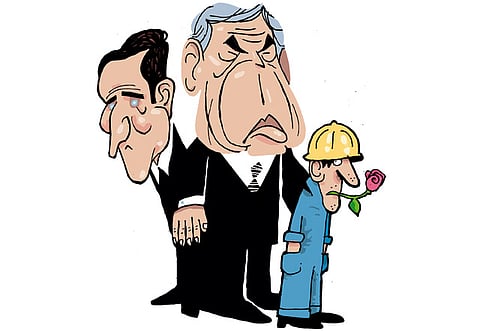Labour will offer a genuine Big Society
The Conservatives' campaign pitch is merely an attempt to con progressives

With just 10 days to go, the outcome of this UK election is now more open than at any time in the last couple of years. A handful of points separate all three parties in the polls, yet one familiar feature endures in this most unfamiliar of elections.
Notwithstanding the rise in support for the Liberal Democrats, who governs will still most likely be decided by the results in around 100 Labour/Conservative marginals and everything suggests we will end up with either Gordon Brown or David Cameron as prime minister after May 6. Labour is in a fight we can win, something most commentators thought impossible until very recently.
Many progressives rightly want electoral reform which Labour has promised but they also need to make a clear-headed choice about who they want running the country after this election. At the heart of that choice will be who has the right vision of fairness and social justice.
Ever since he became Conservative leader, the people around David Cameron have thought it worth his while to send signals about social justice: a mention of inequality here, a social enterprise there.
The basic difference of philosophy and policy is clear if we look at the answers to three key questions around market, state and society. Are you willing to ensure that markets serve the interests of society, not the other way round? Do you have a vision for reform of the state, not opting out from it? Finally, do you believe in a welfare state which serves the majority or one that becomes a bare safety net?
On the first question, New Labour 2010 is different from New Labour 1997 because we have learned lessons. At the heart of our manifesto is a commitment to correct for the failures of the market. This doesn't just mean regulating the banks better, but changing corporate governance to encourage long-termism in the City and intervening to create the green jobs of the future.
And if you care about creating a just economy, it is Labour that is committed to increasing the minimum wage in line with earnings, introducing a living wage in Whitehall and clamping down on interest rates charged by doorstep lenders. A DIY philosophy would leave markets alone and takes no account of the economic future we need.
New bargain
The second question is about how in public services we get a new bargain between citizens, professionals and government. We want clear guarantees for individuals, with redress if standards are not met, and a stronger voice, including in schools and policing. For their part, professionals should be liberated to do more, helping less successful services. That is the vision we are fighting for in the coming days.
The problem with the Conservative vision is that, unlike ours, it will mean abandonment, not empowerment. Abolishing the entitlement to a maximum waiting time for an operation, as the Tories would do, takes power away from the individual and hands it back to the state. Failing to guarantee funding in key public services undermines fairness. Absent government does not make people powerful.
Finally, if you really believe in social solidarity, then binding people together in certain key shared services and interests is essential, as social democrats, and Christian democrats for that matter, recognise in the rest of Europe. So as we cut the deficit, we need to do so in a way that meets this principle.
On the biggest piece of unfinished social reform care for the elderly we say let's take the time, but have the will, to build a truly universal service, and let's maintain tax credits, the Child Trust Fund and Sure Start. The Liberals want to abolish the Child Trust Fund; the Tories would restrict it to the poorest. Both want to cut back tax credits at the same time as they offer tax cuts to some of the most wealthy in society.
Especially in tough times, it is Labour solutions that can make for the more prosperous, fairer, greener, more democratic society we need. David Cameron's Big Society is an attempt to con progressives: you can have the fair society you want without reform of the market or an active, reformed government. It's the same old idea of laissez faire, self-help that we saw in the 1980s, in new clothes. Progressives mustn't be taken in.
Ed Miliband was the co-ordinator of Labour's manifesto.


